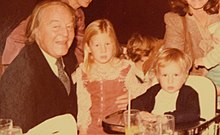

| ||
|---|---|---|
Related |
||
The Stonehill scandal, named after American expatriate businessman Harry Stonehill,[1] was a 1962 bribery scandal in the Philippines which implicated high level government officials, including President Diosdado Macapagal,[2] future President Ferdinand Marcos,[2][3] former President Carlos P. Garcia,[3] and numerous other top Philippine officials, who were accused of accepting bribes to protect Stonehill's $50-million business empire, which included a monopoly on tobacco and other exploited crops and popular local resources.[4]
The scandal erupted when José W. Diokno, who was serving as Justice Secretary under the Macapagal administration at the time, raided the offices of 42 of Stonehill's business establishments on March 2, 1962, and arrested Stonehill along with a number of his associates. The raid resulted in the confiscation of phone-tapping instruments, jamming devices, and other espionage equipment as well as six army trucks worth of documents.[2] Stonehill was accused of tax evasion, economic sabotage, and various other charges, but among the documents were a letter from Stonehill addressed to Macapagal and a "blue book" which listed money given to various government officials, including Macapagal, Garcia, and Marcos.[3] It is considered the first exposed corruption scandal to reach the headlines and become widely publicized, and paved the way for Senate inquiries or cases on plunder, bribery, and graft and corruption.[5]
Macapagal, father of the 14th president Gloria Macapagal Arroyo,[6] ordered Stonehill to be deported in August 1962, which sparked outrage and accusations of a coverup, notably from Diokno, whom Macapagal had prevented from pursuing the prosecution and then sacked from the cabinet via an "official acceptance of his resignation".[7][8] Diokno, in lamenting Macapagal's order to deport Stonehill, said, "How can the government now prosecute the corrupted when it has allowed the corrupter to go?"[4] Some friends of Macapagal even sent death threats to Diokno, prompting Manila Mayor Arsenio Lacson to offer him special protection. Diokno only learned of his resignation through newspapers while he was out of town, further angering citizens.[9]
The scandal is reputed to have cost Macapagal his presidency, where he lost by a landslide to another friend bribed by Stonehill in Ferdinand Marcos during the 1965 Philippine presidential election. Due to the poor approval ratings of Pres. Macapagal, Marcos saw an opportunity to run against Macapagal, his own partymate in the Liberal Party and jumped ship to the opposing Nacionalista Party. He would later cancel both parties in 1972 when he became a dictator through martial law until he was ousted in 1986.[10] Diokno would run for senator the next year and easily win at the 1963 Senate elections, joining the opposing Nacionalista Party (as his father the late Sen. Ramón Diokno was from the same party during his term). Economic historians also note that it helped fuel a brand of economic nationalism which resulted in policies that partly slowed the growth of the Philippine market economy but ultimately benefited society by strengthening the resolve of the people.[2]
- ^ Tubeza, Philip (2002-03-27). "Harry Stonehill is Dead". Philippine Daily Inquirer. Retrieved 2019-01-25.
- ^ a b c d Magno, Alexander R., ed. (1998). "A Web of Corruption". Kasaysayan, The Story of the Filipino People Volume 9:A Nation Reborn. Hong Kong: Asia Publishing Company Limited.
- ^ a b c Soliven De Guzman, Sara (2014-05-26). "A ghost from the past – the Stonehill scandal". The Philippine Star. Retrieved 2019-01-25.
- ^ a b "The Philippines: Smoke in Manila". Time. August 10, 1962. Archived from the original on April 28, 2007. Retrieved August 11, 2009.
- ^ Starner, Frances (January 1963). "The Philippines: Politics of the "New Era"". Asian Survey. 3 (1): 41–47. doi:10.2307/3024649. JSTOR 3024649.
- ^ Philippine Electoral Almanac (Revised and Expanded ed.). Presidential Communications Development and Strategic Planning Office. 2015. p. 216. ISBN 978-971-95551-6-2. Retrieved October 12, 2020.
- ^ Reilly, Peter J. (2011-10-09). "Harry S. Stonehill is Dead but Tax Litigation on 1962 Raid Lives On". Forbes. Retrieved 2019-01-25.
- ^ Doronila, Amando (2013-09-20). "Diokno sacked, key witness murdered". Philippine Daily Inquirer. Retrieved 2019-01-25.
- ^ Dalisay, Jr., Jose (2011-05-23). "José W. Diokno: The Scholar-Warrior by Jose Dalisay, Jr". Facebook. Retrieved 2020-10-21.
- ^ "Ferdinand Marcos inaugurated president of the Philippines". Retrieved 2020-10-21.

